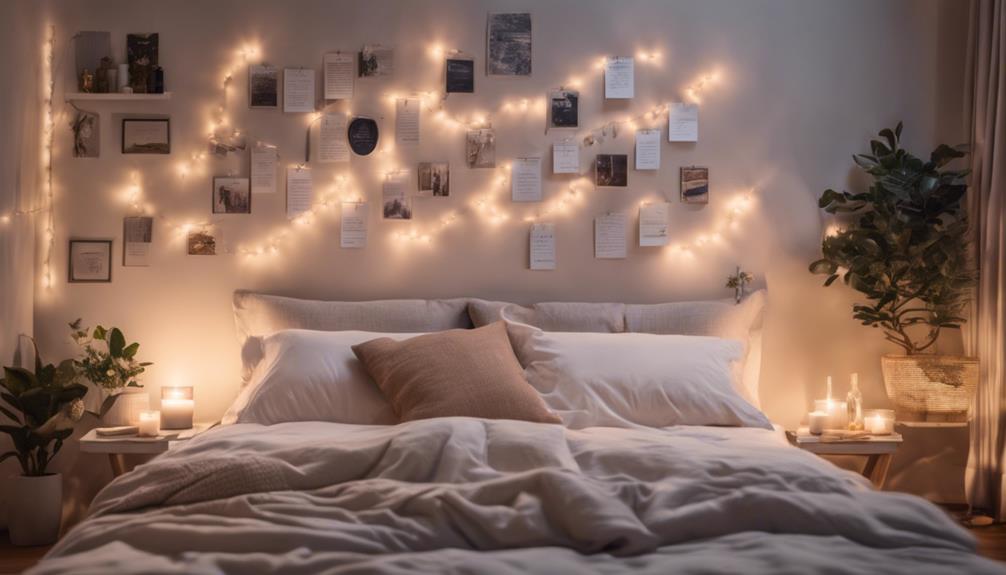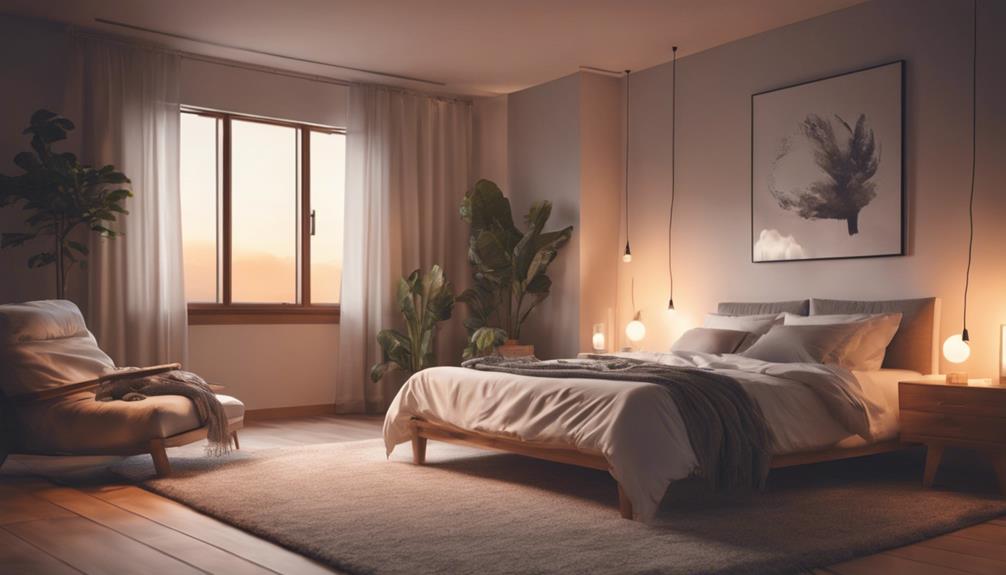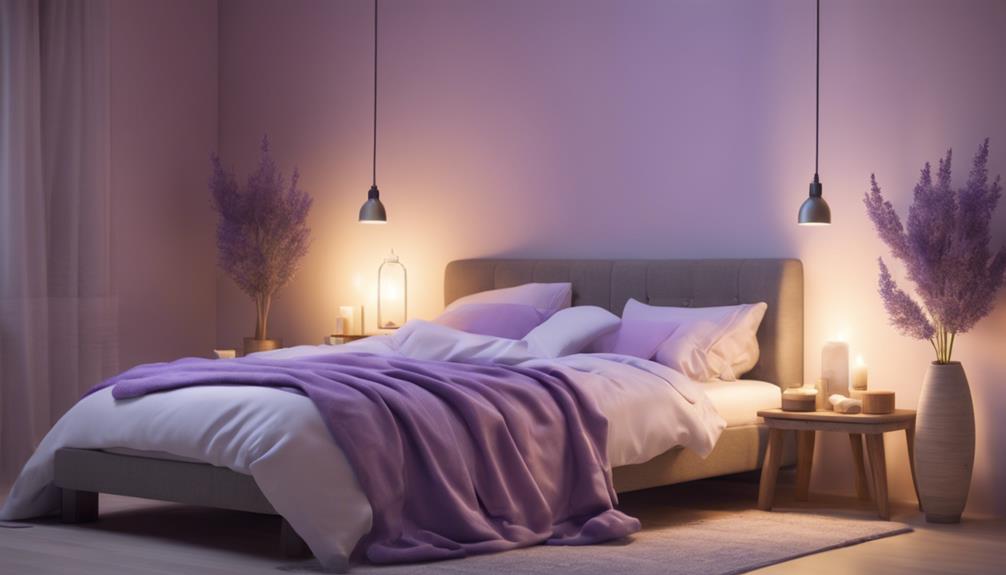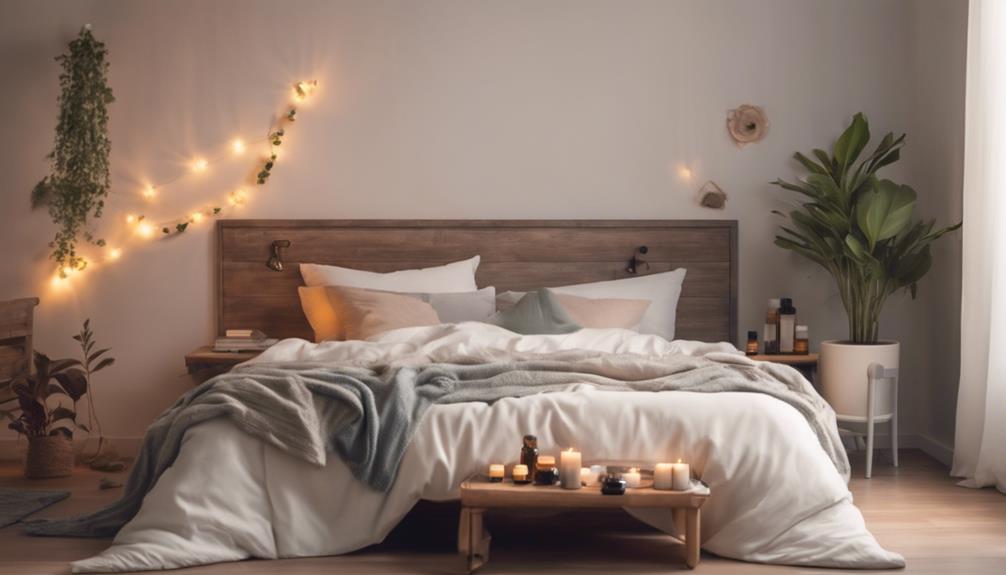Utilize health hypnosis to boost sleep quality by incorporating relaxation techniques, positive affirmations, guided meditation, and creating a serene sleep environment. Deep breathing exercises and hypnotic suggestions can aid in achieving restful sleep patterns consistently. Enhance your nightly routine with calming bedtime rituals to signal your brain for quality sleep. Your journey towards better sleep can begin with health hypnosis practices tailored to your specific needs.
Understanding Health Hypnosis for Sleep

Exploring the application of health hypnosis as a potential method to enhance sleep quality offers a promising avenue for individuals seeking holistic approaches to address their sleep issues. Hypnosis benefits for sleep therapy involve tapping into the subconscious mind to promote relaxation, reduce stress, and alleviate anxiety, all of which are common culprits of poor sleep quality. By harnessing the power of suggestion and guided imagery, hypnosis can help individuals achieve a state of deep relaxation conducive to falling and staying asleep.
Sleep therapy through hypnosis often involves customized sessions tailored to address the specific sleep challenges faced by individuals. These sessions can target underlying issues such as racing thoughts, restlessness, or insomnia, aiming to reframe negative thought patterns and promote a sense of calmness before bedtime.
Additionally, hypnosis for sleep may involve teaching relaxation techniques that individuals can incorporate into their nightly routine to improve sleep quality over time. Overall, the benefits of incorporating health hypnosis into a comprehensive approach to sleep improvement can provide individuals with a natural and effective tool to enhance their overall well-being.
Relaxation Techniques for Better Sleep
Understanding various relaxation techniques can significantly contribute to improving sleep quality, complementing the benefits of health hypnosis in addressing sleep issues. Sleep hygiene plays a crucial role in preparing the mind and body for a restful night's sleep. By incorporating relaxation techniques into your bedtime routine, you can signal to your body that it's time to unwind and prepare for sleep.
One key aspect of relaxation techniques is the mind-body connection. Techniques such as deep breathing, progressive muscle relaxation, and guided imagery help calm the mind and relax the body, promoting a state of tranquility conducive to falling asleep. By engaging in these practices regularly, you can train your body to release tension and stress, making it easier to transition into a peaceful slumber.
Incorporating relaxation techniques into your nightly routine can have a positive impact on your overall sleep quality. By prioritizing relaxation and fostering a strong mind-body connection, you can create a conducive environment for restorative sleep.
Positive Affirmations Before Bed

Incorporating positive affirmations before bed can be a powerful way to cultivate a mindset conducive to restful sleep. Bedtime mantras or sleep affirmations are short, positive statements that can help calm the mind and promote relaxation, making them a valuable addition to your sleep routine.
Engaging in mindfulness meditation while repeating these affirmations can further enhance their effectiveness. By focusing on the present moment and letting go of any racing thoughts, you can create a sense of peace and ease before drifting off to sleep.
Some examples of sleep affirmations include 'I am safe and at peace,' 'My mind and body are ready for rest,' or 'I release all tension from my body.'
By incorporating these affirmations into your bedtime routine, you can signal to your brain that it's time to unwind and prepare for a restful night's sleep.
Embrace the power of positive affirmations to set the stage for a peaceful and rejuvenating sleep experience.
Visualizing Restful Sleep Patterns
To further enhance the efficacy of positive affirmations before bed in promoting restful sleep, visualizing restful sleep patterns can serve as a complementary technique to cultivate a peaceful mindset conducive to a night of deep, rejuvenating rest. Sleep visualization, when incorporated into a bedtime routine, harnesses the mind-body connection to create a calming mental environment that can positively influence sleep patterns.
When engaging in sleep visualization, individuals can imagine themselves in a serene setting, such as a tranquil beach or a cozy mountain cabin. By picturing themselves drifting off to sleep effortlessly and experiencing uninterrupted rest throughout the night, they can signal to the brain that restful sleep is both attainable and expected.
This practice helps to reduce anxiety and quiet the mind, allowing for a smoother transition into sleep. By consistently incorporating sleep visualization into their bedtime routine, individuals can train their minds to associate these calming images with the act of falling asleep, ultimately leading to improved sleep patterns and overall sleep quality.
Guided Meditation for Sleep Improvement

Utilizing guided meditation as a tool for enhancing sleep quality has shown promising results in promoting relaxation and facilitating a restful night's sleep. Incorporating techniques such as mindful breathing can help calm the mind and body, preparing them for a restorative sleep experience. By focusing on deep, intentional breathing, individuals can release tension and stress, allowing for a more peaceful transition into sleep.
Another beneficial aspect of guided meditation for sleep improvement is sleep visualization. This technique involves mentally visualizing a serene and tranquil sleep environment, engaging the senses to create a vivid mental image of a peaceful bedtime setting. This visualization can help in calming the mind and setting the stage for a restful night's sleep.
Incorporating guided meditation into a bedtime routine can be a valuable tool for those seeking to improve their sleep quality. By practicing mindful breathing and engaging in sleep visualization, individuals can create a conducive environment for relaxation and enhance their overall sleep experience.
Overcoming Insomnia Through Hypnosis
Addressing insomnia through the practice of hypnosis offers a promising approach to improving sleep quality and restoring healthy sleep patterns. Hypnosis can help individuals struggling with insomnia by addressing underlying issues that may be contributing to sleep disturbances.
Sleep hygiene plays a crucial role in managing insomnia. This involves creating a sleep-conducive environment, maintaining a regular sleep schedule, and avoiding stimulants close to bedtime. Hypnosis can assist individuals in implementing and adhering to these sleep hygiene practices, promoting better sleep habits.
Furthermore, cognitive therapy techniques utilized in hypnosis can help individuals challenge and reframe negative thought patterns or beliefs that may be interfering with their ability to fall asleep or stay asleep. By addressing these cognitive aspects, hypnosis can help individuals develop a more positive mindset towards sleep, reducing anxiety and promoting relaxation.
Deep Breathing Exercises for Sleep

In the realm of enhancing sleep quality, one effective method that can be beneficial is practicing deep breathing exercises specifically designed to promote relaxation and improve sleep onset.
Deep breathing exercises are a cornerstone of sleep hygiene, aiding in calming the mind and body before bedtime. By focusing on deep, slow breaths, individuals can activate the parasympathetic nervous system, triggering a relaxation response that helps in falling asleep faster.
These exercises tap into the mind-body connection, emphasizing the importance of calming the mind to achieve a state of physical relaxation conducive to sleep.
When practiced regularly, deep breathing can become a powerful tool in improving overall sleep quality. Incorporating deep breathing exercises into a nightly routine can signal to the body that it is time to wind down, promoting a more restful and rejuvenating night's sleep.
Using Hypnotic Suggestions for Relaxation
Enhancing relaxation through the use of hypnotic suggestions can be a transformative approach to promoting deep and restful sleep. Stress management is a crucial aspect of achieving quality sleep, and hypnotic suggestions can aid in alleviating stress by guiding individuals into a state of deep mental relaxation.
By incorporating tailored hypnotic scripts, individuals can be guided to visualize calming scenarios, release tension from their bodies, and quieten their minds, thus fostering a sense of tranquility that is conducive to falling asleep easily.
Hypnotic suggestions for relaxation often involve encouraging individuals to focus on their breathing, gradually slowing it down to induce a state of calmness. Through these suggestions, the mind can be directed away from intrusive thoughts or worries that commonly disrupt sleep.
This redirection of focus towards relaxation can play a significant role in preparing the mind and body for a night of deep, rejuvenating sleep. By incorporating hypnotic suggestions for relaxation into a bedtime routine, individuals may experience improved sleep quality and overall well-being.
Creating a Calm Sleep Environment

Establishing a tranquil sleep environment is essential for promoting optimal rest and rejuvenation during the night. Sleep hygiene plays a crucial role in creating a calming atmosphere conducive to quality sleep.
Maintaining a consistent sleep schedule, avoiding stimulants before bedtime, and ensuring a comfortable mattress and pillows are all integral aspects of sleep hygiene that contribute to a peaceful sleep environment.
In addition to sleep hygiene practices, bedroom decor can significantly impact the quality of one's rest. Opt for soothing colors like soft blues or greens that promote relaxation.
Keep the room clutter-free and well-organized to reduce distractions and promote a sense of tranquility. Dimming the lights and using blackout curtains can help signal to the brain that it's time to wind down for sleep.
Consistency in Hypnosis Practice for Sleep
Maintaining a regular and dedicated practice of health hypnosis techniques can significantly enhance the quality of sleep over time. Consistency in hypnosis practice for sleep involves a daily commitment to engaging in hypnotic routines that promote relaxation and prepare the mind and body for rest.
By establishing a consistent bedtime ritual that incorporates hypnosis, individuals can signal to their brains that it is time to unwind and prepare for sleep. This daily commitment to practicing health hypnosis techniques can help regulate sleep patterns and improve overall sleep quality.
Sleep consistency is key when utilizing hypnosis for better sleep. It is essential to practice health hypnosis techniques regularly to allow the mind to become accustomed to the process and reap the full benefits. By incorporating hypnosis into a nightly routine, individuals can create a sense of predictability and signal to the body that it is time to relax and prepare for restorative sleep.
Consistent practice of health hypnosis techniques can lead to improved sleep quality and overall well-being.
Frequently Asked Questions
Can Health Hypnosis Help With Sleep Disorders Like Sleep Apnea?
Hypnosis can be effective in managing sleep disorders like sleep apnea by targeting underlying psychological factors contributing to the condition. Hypnosis treatment aims to improve sleep quality through relaxation techniques and addressing subconscious patterns affecting sleep.
Is It Possible to Undergo Hypnosis for Sleep Improvement Remotely?
Yes, it is possible to undergo hypnosis for sleep improvement remotely through virtual sessions or online programs. These methods provide convenient access to hypnotherapy from the comfort of your own space, offering effective support for better sleep.
Are There Specific Foods That Enhance the Effects of Health Hypnosis?
Dietary recommendations can enhance the effects of health hypnosis. Foods rich in tryptophan like turkey, nuts, and seeds can promote relaxation. Supplement suggestions like magnesium or melatonin may also aid in improving sleep quality. Lifestyle changes and mindfulness practices can further support these efforts.
Can Hypnosis for Sleep Be Effective for Children and Teenagers?
Hypnosis for sleep can be effective for children and teenagers struggling with child insomnia or poor teen sleep habits. It offers a safe, non-invasive approach to addressing sleep issues, promoting relaxation, and enhancing overall sleep quality.
Is It Recommended to Combine Hypnosis With Other Sleep Aids?
Combining methods can enhance the effectiveness of hypnosis for sleep. It is recommended to consult with a healthcare provider before combining hypnosis with other sleep aids to ensure safety, efficacy, and personalized treatment that aligns with individual needs.
Conclusion
In conclusion, utilizing health hypnosis techniques can greatly improve sleep quality. This can be achieved through promoting relaxation, positive affirmations, visualization, guided meditation, deep breathing exercises, and creating a calm sleep environment.
Consistent practice of hypnosis for sleep can lead to better overall rest and well-being. By incorporating these strategies into your routine, you can experience a more restful and rejuvenating night's sleep.
